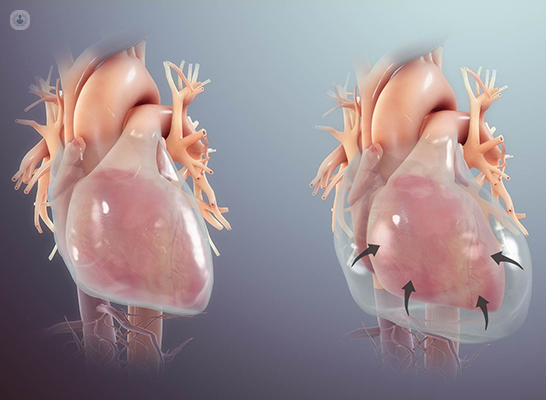

What is pericarditis?
Pericarditis is the inflammation of the pericardium which is the thin outer sac that surrounds the heart. Common symptoms include chest pain, which is acute and subsides quickly. However, sometimes pericarditis can be chronic. Often cases of pericarditis will improve on their own, but more severe cases do require treatment.

What are the symptoms of pericarditis?
Symptoms will vary depending on what type of pericarditis you are experiencing. Your pericarditis may be acute, chronic or recurrent. Common symptoms include:
- Sharp, throbbing pain over the middle or left side of the chest. Often this intensifies when inhaling.
- Palpitations
- Fatigue
- A dry cough
- Swelling in the ankles, legs and feet
- Mild fever
There is the possibility of complications arising from untreated pericarditis or pericarditis that has a late diagnosis. This includes constrictive pericarditis which is the permanent thickening and contraction of the pericardium, preventing the heart from working properly. Another complication is cardiac tamponade which is when too much fluid collects in the pericardium, preventing the heart from filling properly with blood.
What causes pericarditis?
The cause of pericarditis can be difficult to determine. Often though it is due to an infection (viral, bacterial or fungal). Additionally, pericarditis can be caused by:
- Following a heart attack or heart surgery
- Trauma
- Other health problems (e.g. AIDS, tuberculosis or cancer)
- Some medications
- Lupus and rheumatoid arthritis
Can pericarditis be prevented?
Many cases cannot be prevented.
How is pericarditis diagnosed?
A diagnosis will begin with a thorough assessment of your medical history and your symptoms, as well as a physical examination. It is likely you will have an electrocardiogram (ECG), echocardiogram, X-ray and a CT scan to exclude other possible causes of your chest pain.
What is the treatment for pericarditis?
Treatment depends on the severity of the symptoms and whether it is acute or chronic. Mild cases will usually improve on their own without treatment. If medication is given, you will likely have painkillers, a drug called colchicine (this reduced inflammation) or corticosteroids. If the cause is a bacterial infection, antibiotics will be given. If you are suspected of having a complication (e.g. cardiac tamponade), you may need a surgical procedure to reduce the build-up of fluid in the pericardium.
